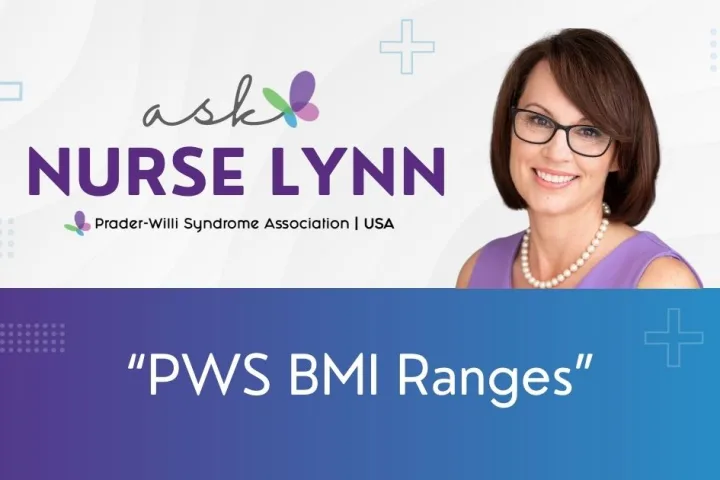Question:
Female, 62 years old, unknown subtype
My sister has PWS. We live in Quebec Canada. There is so little information about how people with PWS age. We have reduced her meds recently due to aging (Bupropion by half and she is now taking Lorazepam to handle side effects). She takes medicine due to pre-diabetes. She is losing weight gradually due to very careful carbs management and regular exercise. What should we watch for as she ages? Can you refer me to information or websites about aging in people with PWs? Anything would be helpful, Her sister.
Nurse Lynn’s Response:
Thank you for your question. Aging in PWS is one of my favorite topics!
Aging in PWS is a hot topic area right now in our community. Unfortunately, not a lot of research has been done about the subject. We hope to change that. Because of earlier diagnosis and access to knowledgeable providers, we see individuals live into their 70’s!
Aging for individuals with PWS presents distinct challenges that may differ from those of the general population. They experience increased risks of health complications such as cardiovascular disease, obesity-related issues, and metabolic disorders, all of which can be compounded by hyperphagia. One of the characteristics of PWS is low muscle tone (hypotonia), which can lead to an increased risk of mobility issues and falls and an increased risk for respiratory and swallowing difficulties. Bone density should be monitored by DEXA scans along with other lab values.
Some frequent blood tests include:
• TSH, free T3, free T4
• Hemoglobin A1c or fasting glucose
• Vitamin D
• Hemoglobin
• Sodium, potassium, creatinine
• Lipids, cholesterol, liver enzymes
• Men: testosterone, Luteinizing hormone
• Women: Estradiol, FSH
• IGF-1- for those on GH
Resources:
I am linking a recent webinar on aging, offering excellent insights into aging issues.
Part 1: PWS Aging Research and Health Updates – Part 1 – YouTube
Part 2: PWS Aging Research and Health Updates – Part 2 – YouTube
Linked below are articles that touch on aging:
Physical health problems in adults with Prader-Willi syndrome – PubMed (nih.gov)
Evidence for Accelerated Biological Aging in Young Adults with Prader–Willi Syndrome | The Journal of Clinical Endocrinology & Metabolism | Oxford Academic (oup.com)
Increased brain age in adults with Prader-Willi syndrome – ScienceDirect
Fact-Sheet-ADULT-final.pdf (pwsausa.org)
PowerPoint Presentation (pwsausa.org)
Do you have a question for Nurse Lynn? Submit your question here:
Share this!





 Perry A. Zirkel has written more than 1,500 publications on various aspects of school law, with an emphasis on legal issues in special education. He writes a regular column for NAESP’s Principal magazine and NASP’s Communiqué newsletter, and he did so previously for Phi Delta Kappan and Teaching Exceptional Children.
Perry A. Zirkel has written more than 1,500 publications on various aspects of school law, with an emphasis on legal issues in special education. He writes a regular column for NAESP’s Principal magazine and NASP’s Communiqué newsletter, and he did so previously for Phi Delta Kappan and Teaching Exceptional Children. Jennifer Bolander has been serving as a Special Education Specialist for PWSA (USA) since October of 2015. She is a graduate of John Carroll University and lives in Ohio with her husband Brad and daughters Kate (17), and Sophia (13) who was born with PWS.
Jennifer Bolander has been serving as a Special Education Specialist for PWSA (USA) since October of 2015. She is a graduate of John Carroll University and lives in Ohio with her husband Brad and daughters Kate (17), and Sophia (13) who was born with PWS. Dr. Amy McTighe is the PWS Program Manager and Inpatient Teacher at the Center for Prader-Willi Syndrome at the Children’s Institute of Pittsburgh. She graduated from Duquesne University receiving her Bachelor’s and Master’s degree in Education with a focus on elementary education, special education, and language arts.
Dr. Amy McTighe is the PWS Program Manager and Inpatient Teacher at the Center for Prader-Willi Syndrome at the Children’s Institute of Pittsburgh. She graduated from Duquesne University receiving her Bachelor’s and Master’s degree in Education with a focus on elementary education, special education, and language arts. Evan has worked with the Prader-Willi Syndrome Association (USA) since 2007 primarily as a Crisis Intervention and Family Support Counselor. Evans works with parents and schools to foster strong collaborative relationships and appropriate educational environments for students with PWS.
Evan has worked with the Prader-Willi Syndrome Association (USA) since 2007 primarily as a Crisis Intervention and Family Support Counselor. Evans works with parents and schools to foster strong collaborative relationships and appropriate educational environments for students with PWS. Staci Zimmerman works for Prader-Willi Syndrome Association of Colorado as an Individualized Education Program (IEP) consultant. Staci collaborates with the PWS multi-disciplinary clinic at the Children’s Hospital in Denver supporting families and school districts around the United States with their child’s Individual Educational Plan.
Staci Zimmerman works for Prader-Willi Syndrome Association of Colorado as an Individualized Education Program (IEP) consultant. Staci collaborates with the PWS multi-disciplinary clinic at the Children’s Hospital in Denver supporting families and school districts around the United States with their child’s Individual Educational Plan. Founded in 2001, SDLC is a non-profit legal services organization dedicated to protecting and advancing the legal rights of people with disabilities throughout the South. It partners with the Southern Poverty Law Center, Protection and Advocacy (P&A) programs, Legal Services Corporations (LSC) and disability organizations on major, systemic disability rights issues involving the Individuals with Disabilities Education Act (IDEA), Americans with Disabilities Act (ADA), and the federal Medicaid Act. Recently in November 2014, Jim retired.
Founded in 2001, SDLC is a non-profit legal services organization dedicated to protecting and advancing the legal rights of people with disabilities throughout the South. It partners with the Southern Poverty Law Center, Protection and Advocacy (P&A) programs, Legal Services Corporations (LSC) and disability organizations on major, systemic disability rights issues involving the Individuals with Disabilities Education Act (IDEA), Americans with Disabilities Act (ADA), and the federal Medicaid Act. Recently in November 2014, Jim retired.